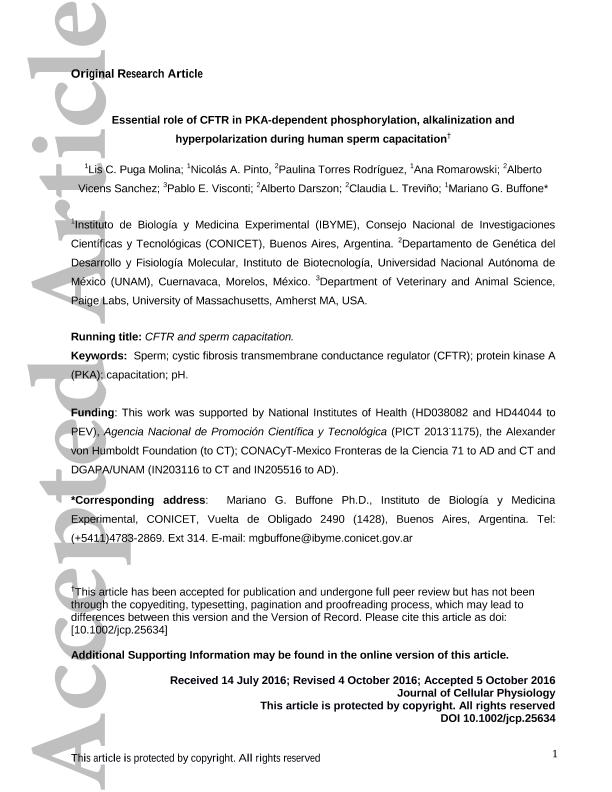Artículo
Essential role of CFTR in PKA-dependent phosphorylation, alkalinization, and hyperpolarization during human dperm capacitation
Puga Molina, Lis del Carmen ; Pinto, Nicolás Alejandro
; Pinto, Nicolás Alejandro ; Torres Rodríguez, Paulina; Romarowski, Ana
; Torres Rodríguez, Paulina; Romarowski, Ana ; Vicens Sanchez, Alberto; Visconti, Pablo E.; Darszon, Alberto; Treviño, Claudia L.; Buffone, Mariano Gabriel
; Vicens Sanchez, Alberto; Visconti, Pablo E.; Darszon, Alberto; Treviño, Claudia L.; Buffone, Mariano Gabriel
 ; Pinto, Nicolás Alejandro
; Pinto, Nicolás Alejandro ; Torres Rodríguez, Paulina; Romarowski, Ana
; Torres Rodríguez, Paulina; Romarowski, Ana ; Vicens Sanchez, Alberto; Visconti, Pablo E.; Darszon, Alberto; Treviño, Claudia L.; Buffone, Mariano Gabriel
; Vicens Sanchez, Alberto; Visconti, Pablo E.; Darszon, Alberto; Treviño, Claudia L.; Buffone, Mariano Gabriel
Fecha de publicación:
06/2017
Editorial:
Wiley Periodicals Inc.
Revista:
Journal of Cellular Physiology
ISSN:
0021-9541
e-ISSN:
1097-4652
Idioma:
Inglés
Tipo de recurso:
Artículo publicado
Clasificación temática:
Resumen
Mammalian sperm require to spend a limited period of time in the female reproductive tract to become competent to fertilize in a process called capacitation. It is well established that HCO3 − is essential for capacitation because it activates the atypical soluble adenylate cyclase ADCY10 leading to cAMP production, and promotes alkalinization of cytoplasm, and membrane hyperpolarization. However, how HCO3 − is transported into the sperm is not well understood. There is evidence that CFTR activity is involved in the human sperm capacitation but how this channel is integrated in the complex signaling cascades associated with this process remains largely unknown. In the present work, we have analyzed the extent to which CFTR regulates different events in human sperm capacitation. We observed that inhibition of CFTR affects HCO3 −-entrance dependent events resulting in lower PKA activity. CFTR inhibition also affected cAMP/PKA-downstream events such as the increase in tyrosine phosphorylation, hyperactivated motility, and acrosome reaction. In addition, we demonstrated for the first time, that CFTR and PKA activity are essential for the regulation of intracellular pH, and membrane potential in human sperm. Addition of permeable cAMP partially recovered all the PKA-dependent events altered in the presence of inh-172 which is consistent with a role of CFTR upstream of PKA activation.
Palabras clave:
Cftr
,
Humans
,
Alkalinization
,
Sperm Capacitation
,
Cyclic Amp
Archivos asociados
Licencia
Identificadores
Colecciones
Articulos(IBYME)
Articulos de INST.DE BIOLOGIA Y MEDICINA EXPERIMENTAL (I)
Articulos de INST.DE BIOLOGIA Y MEDICINA EXPERIMENTAL (I)
Citación
Puga Molina, Lis del Carmen; Pinto, Nicolás Alejandro; Torres Rodríguez, Paulina; Romarowski, Ana; Vicens Sanchez, Alberto; et al.; Essential role of CFTR in PKA-dependent phosphorylation, alkalinization, and hyperpolarization during human dperm capacitation; Wiley Periodicals Inc.; Journal of Cellular Physiology; 232; 6; 6-2017; 1404-1414
Compartir
Altmétricas



